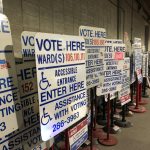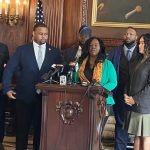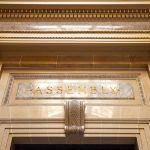Concerns About Forced Labor in China Delaying Wisconsin Solar Projects
Customs reviews needed for foreign-made panels that sit in Chicago-area warehouse.

Invenergy has developed multiple solar projects in Wisconsin, including the 300-megawatt Badger Hollow Solar Farm. The first 150 megawatts of that project, pictured here, went online on Dec. 1, 2021. Invenergy is also the developer behind the Koshkonong Solar Energy Center in Dane County. Photo courtesy of Wisconsin Public Service.
Work on a sprawling solar park in Kenosha County’s town of Paris is on hold as federal investigators try to determine whether solar panels purchased for the project were made with forced labor.
The $400 million Paris Solar-Battery Park was initially supposed to be completed and in service by this May, but no solar panels have been installed on the 1,500-acre project site. The target for completion has been pushed to the end of the year.
That’s because the panels needed to finish the project are sitting in a Chicago-area warehouse, waiting for a review from U.S. Customs and Border Protection to ensure they were not made with forced labor from China, according to Dan Krueger, executive vice president of infrastructure and generation planning for WEC Energy Group.
WEC Energy Group’s two Wisconsin utilities, We Energies and Wisconsin Public Service, will own 90 percent of the Paris project while Madison Gas & Electric would own the remaining 10 percent. The 200-megawatt solar project will produce enough power for around 60,000 homes, as well as provide 110 megawatts of battery storage.
But the Paris Solar-Battery Park isn’t the only Wisconsin project facing delays from concerns around forced labor in China. So too is the second phase of the Badger Hollow Solar Park in Iowa County, another joint venture between the two WEC utilities and Madison Gas & Electric.
President Joe Biden signed the bipartisan Uyghur Forced Labor Prevention Act, or UFLPA, in December 2021. The law bans importing goods that were manufactured using forced labor in China, specifically the Xinjiang Uyghur Autonomous Region.
Krueger said WEC Energy Group is “fully supportive” of the review by federal authorities. He said U.S. Customs and Border Protection has released about one-third of the panels for the second phase of the Badger Hollow Project, but the utilities are still waiting on the rest.
“We remain confident that we have full traceability, that these panels fully comply with UFLPA and we are awaiting verification and clearance from U.S. Customs,” Krueger said. “I believe their hands are full, so we don’t have any dates at this time from them.”
Other utility-scale solar projects around the country have faced similar delays due to the ban, according to Reuters. U.S. Customs and Border Protection detained 1,000 panel shipments by November 2022, but that figure rose to an estimated 1,400 as of early March 2023, Reuters reported.
Outside the energy sector, a Wisconsin Watch investigation published in May found evidence that a supplier for Milwaukee Tool may have used forced labor from Chinese prisoners to make work gloves bearing the Brookfield-based company’s name. While a company spokesperson told Wisconsin Watch that Milwaukee Tool found “no evidence” to support those claims, the allegations have spurred a Congressional investigation and caused Walmart, America’s largest retailer, to pull the gloves from its online marketplace.
Although WEC Energy Group doesn’t have a firm timeline on when its panels will be released by federal authorities, the review has caused the company to look toward other suppliers, Krueger said.
“In terms of completing Badger Hollow (phase) two and the Paris project, we are looking at replacing those panels, if possible, with similar panels with different components not from China,” he said. “We are beginning to see some success there. For future projects, we are sourcing those panels with certain U.S. or non-Chinese components, and we are confident this will allow us to avoid similar delays.”
Krueger pointed to the Darien Solar Energy Center in Rock and Walworth counties — another 90-10 split between WEC’s utilities and Madison Gas & Electric — as an example of one such future project.
“We are working with our developer to place orders for panels with key components coming out of the U.S. instead of China,” he said of that project. “You can’t get a fully American-built panel because certain components still are all built overseas, but some of the parts that have been in question we are now beginning to substitute.”
Alliant Energy, another major Wisconsin utility, has not experienced delays related to the labor investigations, according to spokesperson Morgan Hawk. In a statement, Hawk said three of Alliant’s 12 utility-scale solar projects in Wisconsin are operational and construction is underway on the remaining nine, with most scheduled to come online in 2024.
“None of the panels for these projects were delayed by U.S. Customs for review under the UFLPA statute,” Hawk said. “When it comes to acquiring the solar panels for our projects in Wisconsin, we carefully vet our solar panel suppliers, and we are confident that we do not use panels made with forced labor.”
Wisconsin Conservation Voters Government Affairs Director Jennifer Giegerich said the delays underscore the need to produce renewable energy technologies domestically.
Giegerich said the Biden Administration has made investments to bolster American solar manufacturing. She said producing renewable technology in the U.S. will help local communities, businesses and utilities to more efficiently get clean energy projects online as needed.
“If we don’t actually have the workforce and the manufacturing here in the United States to do that, then we are not becoming as energy independent as we want to be — we’re still dependent on other countries to provide those resources,” she said. “The whole point of energy independence is to make sure that we have a cleaner environment, but that we also control the ability to put the kind of clean energy technologies we want online.”
Listen to the WPR report here
Wisconsin solar projects face delays from federal review to ensure no panels used Chinese forced labor was originally published by Wisconsin Public Radio





















How are they gonna tell who made what where by who? Would China really slap a label on the boxes saying that forced labor made them? What a joke. I get the point of the law but it seems like one of those best(least)-effort things that allows for a whole bunch of shady crap going on in the back. Meh.
All of these utility-scale RE projects should be owned by public school systems or municipalities. Invenergy is just as corrupt as the oil suckers that bring war and death. Fuck invenergy and WEC.